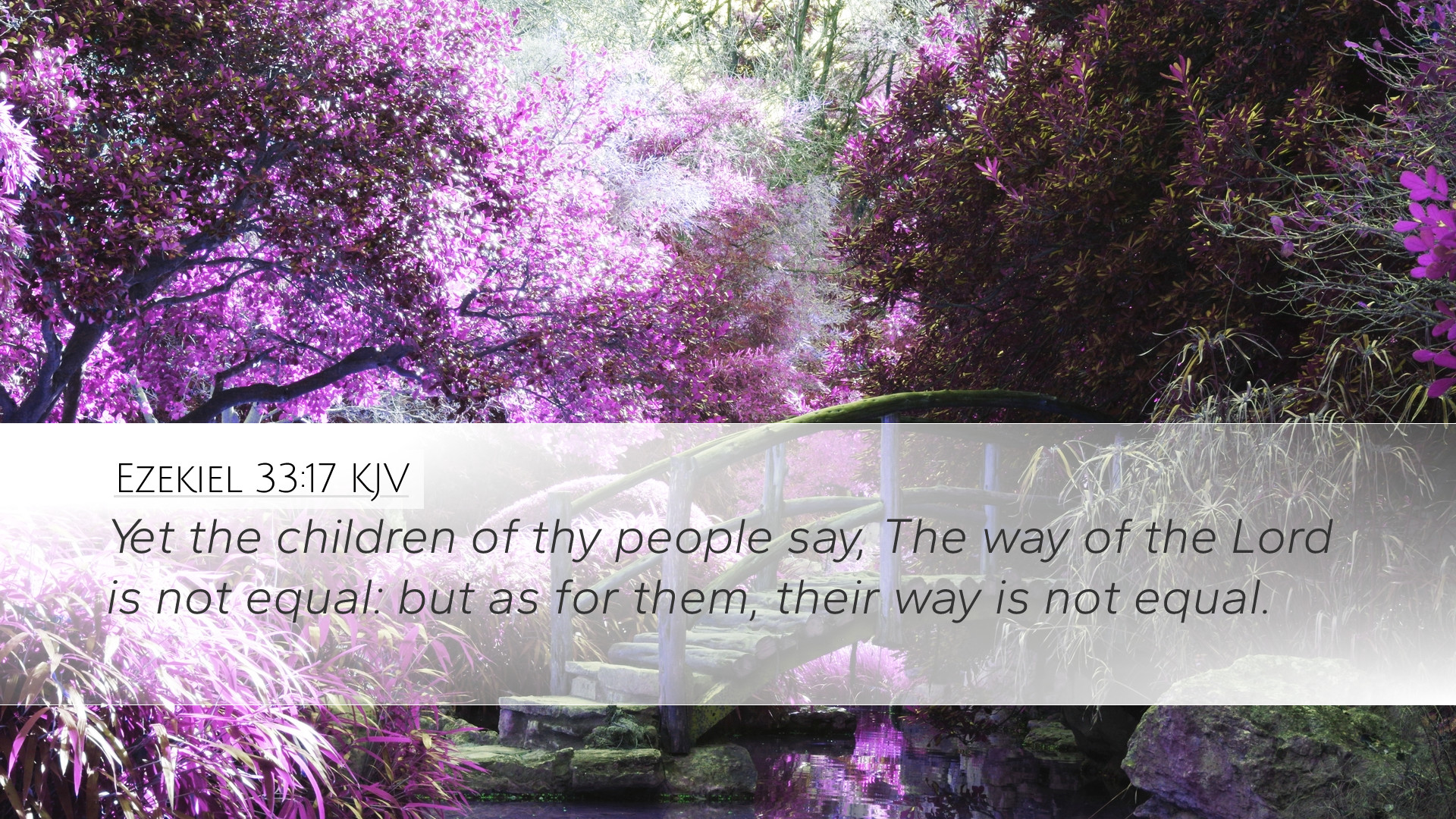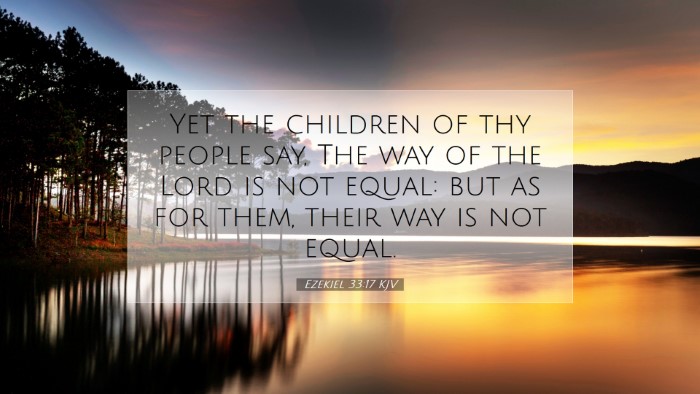Ezekiel 33:17 Commentary
Ezekiel 33:17 states: "Yet your people say, ‘The way of the Lord is not fair.’ But it is their way that is not fair." This verse serves as a pivotal point in Ezekiel's ministry, underscoring the nature of God's justice and the response of the people of Israel. In this commentary, we will examine the theological implications, historical context, and significant insights derived from renowned public domain commentaries by Matthew Henry, Albert Barnes, and Adam Clarke.
Contextual Overview
The Book of Ezekiel is set during the Babylonian exile, a period of intense upheaval for the Jewish people. The prophet Ezekiel's role is to convey God's messages of judgment and hope. The verses surrounding Ezekiel 33:17 include declarations about the responsibilities of the watchman and the dire consequences of unrepentant sin. Understanding the context is critical for grasping the weight of this verse.
The Justice of God
In examining God's justice as presented in this verse, we note that the Israelites are quick to proclaim God's ways as unfair. This accusation reveals a fundamental misunderstanding of divine justice. Matthew Henry comments on this by emphasizing that “God's ways are just, and it is the people’s sins that distort their perceptions of justice.” The Israelites' complaints stem from a deep-rooted propensity to view God's actions through their own flawed human understanding.
Albert Barnes reflects on this sentiment, stating, “The inconsistency between God's judgments and the expectations of the people is revealing of their spiritual condition.” He argues that the complaints reflect an unwillingness to accept responsibility for their own actions and the consequences thereof. This perspective invites pastors and theologians to examine their congregations for similar attitudes, where the focus on external circumstances distracts from personal accountability.
Human Accountability
Ezekiel 33:17 serves as a reminder of human accountability. The repeated refrain of the people accusing God of unfairness demonstrates their failure to recognize their complicity in their situation. Adam Clarke points out the depth of this rebellion, stating, “Their failure to acknowledge God's justice and grace illustrates a heart that is hardened against conviction.” This insight emphasizes the necessity for a humble approach to God’s word and a readiness to accept His authority.
- Acceptance of Responsibility: The people’s inability to grasp their role in the unfolding narrative reflects a broader tendency to shift blame.
- Call to Repentance: Recognizing the gap between divine justice and human expectation invites believers to repent and seek alignment with God's will.
- Understanding God’s Sovereignty: It is vital for both scholars and laypersons to comprehend that God's ways are not beholden to human understanding.
Implications for Ministry
For pastors and church leaders, this verse carries significant implications for ministry. It challenges leaders to teach and preach about the nature of God’s justice and the necessity of personal responsibility. Henry notes, “A faithful minister must declare the whole counsel of God, addressing both comfort and confrontation.” In ministering to congregations, there is a delicate balance that must be observed—between conveying God’s love and asserting His justice.
Additionally, clergy should facilitate spaces where congregants can explore their understanding of justice in light of scripture. Clarke emphasizes the need for communion and dialogue among believers, promoting an environment where questions about God’s ways can be openly discussed. This approach evolves faith and encourages the community to grow together in understanding.
Reflection on God’s Character
Ezekiel 33:17 is a verse that invites reflection on the character of God. Despite the rebellious nature of His people, God's promises remain steadfast. The assertion of fairness—or the perceived lack of it—reveals not just the heart of the Israelites, but also God's persistent pursuit of His people. Barnes reminds us, “Even when we are faithless, He remains faithful.” This understanding is crucial for biblical scholars as they examine the consistency of God's character throughout scripture.
Conclusion
In conclusion, Ezekiel 33:17 serves as a powerful reminder of the nature of divine justice and human accountability. The insights garnered from the commentaries of Henry, Barnes, and Clarke provide a multifaceted view of the challenges presented in this verse. This commentary not only serves students of the Bible, scholars, and pastors but also compels all believers to examine their understanding of God's ways compared to their own perceptions of fairness.
As we grapple with these truths, may we seek a deeper relationship with God, desiring to align our hearts with His will and embrace the justice that flows from His character.


